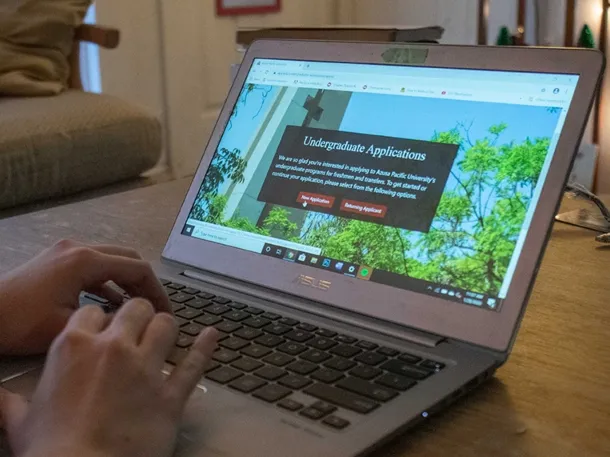- Home
- >
- APU Articles
- >
- News Article
Your College Application Checklist: 8 Tips for Success
February 11, 2020 | Written By Stephanie Thurrott

This college application checklist can make it a bit easier; it includes eight helpful strategies to navigate the application process. Here’s what you need to know about the questions you’ll answer, essays you’ll write, recommendations you’ll request, and test score reports you’ll need to submit.
1. Just Get Started
The whole process of applying to college can seem intimidating at first, but you can (and will) do it! All it takes is some concentration, perseverance, and a plan.
2. Outline Each School’s Requirements
When you’ve got your list of colleges and universities, compile each school’s specific requirements into one document. Some schools only require the standard common application or a straightforward school-specific application. Others may require that you write an additional essay, answer a set of questions, or line up letters of recommendation.
At certain schools, programs like nursing or engineering may have additional requirements. For instance, here’s what you’ll need to complete your first-year application to Azusa Pacific University. Once you know your application requirements, try to set aside 15 minutes a day to make some progress.
3. Track Your Deadlines
If your high school uses Naviance or another college planning platform, the software can help you stay on top of your college applications and their respective deadlines. Otherwise, you’ll want to set up a spreadsheet or circle dates on a calendar to make sure you get everything completed on time.
It’s also smart to give yourself plenty of time to put together the best application package possible for each school. You don’t want to be rushing through your applications at the last minute.
4. Start Your Essay Early
In that vein, give yourself time to write a few drafts of your application essay, edit it, and have it proofread. You should have your family and friends read your essay to provide feedback, and if you can, request that your English teacher or guidance counselor take a look too.
It’s important to take their critiques constructively and spend ample time editing your writing. You want to put your best foot forward and impress those admissions representatives!
5. Ask for Letters of Recommendation
A lot of high school students ask for letters of recommendation from their favorite teachers. Accordingly, teachers tend to get deluged with these requests—often all at once. To avoid putting a strain on their schedules, ask your teachers for recommendation letters early on.
This will allow them plenty of time to meet the deadline and may result in more personalized letters. Be prepared to provide information about your intended career path, extracurricular activities, and other details your teachers may want to use to personalize the recommendations.
6. Take Your Exams as Soon as You Can (and Apply Early)
SAT and ACT exams are sometimes required for your college application, but not always. At Azusa Pacific, both exams are not required but can add an additional demonstration of your academic achievement to your application. If you need to (or choose to) take either of the exams, sign up as soon as you can.
Getting these tests finished early will free up time, giving you more flexibility to work on your college applications. And if you don’t score as well as you expect, you’ll have time to take them again, if you choose.
Once you’ve compiled all the materials you need to apply, don’t wait to send them in. Many schools open their applications on August 1 and accept early applications through November 1 or 15. If you apply early, you won’t have to worry about completing your applications when you’re immersed in your senior-year schoolwork and extracurriculars. Plus, acceptance rates are higher, on average, for students who apply early.
7. Complete Your FAFSA and Budget for Fees
Once your applications are complete, you’ll want to complete the Free Application for Federal Student Aid (FAFSA) and send it to the schools where you’ve applied. This source of government funding is the largest provider of student financial aid in the nation. Any eligible student—regardless of age, income, or nationality—can apply. Aid (and merit-based awards) are available to those who qualify, so it’s a good idea to get your application in as soon as possible.
It’s also wise to budget for fees you may not be aware of. Most schools charge you to submit your application, and these nonrefundable fees can run up to $90 each (at APU, it’s just $45). If you’re applying to multiple colleges, it’s especially important to map out a budget early. Some schools will waive their fees if you demonstrate financial need.
Understand College Financial Aid
8. If You Have Questions, Ask!
College admissions representatives are there to help students navigate the application process. If something isn’t clear, don’t hesitate to reach out to them. You can find the name and contact information of admissions representatives on the admissions pages on most colleges’ websites. If you can’t find the representative for your city or state, try the general email address or phone number for the admissions office. These professionals are here to help—but you’ll need to reach out for their assistance.
Is Azusa Pacific on your list of colleges to apply to? Learn more about APU’s admissions requirements and start your application today!